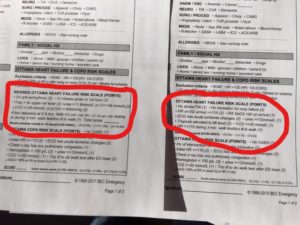Quality of care, return visits and physician documentation
Health Quality Ontario has just provided an evaluation of the first year of the ‘Emergency Department RETURN VISIT QUALITY PROGRAM’. 86 ED’s in Ontario participated in this program.
571 of 2,365 (24.1%) audited all-cause 72-hour return visits had quality issues/adverse events identified. 107 of 219 (48.9%) audited sentinel diagnoses (missed MI, Subarachnoid haemorrhage and paediatric sepsis) had quality issues/adverse events.
Quality issues/adverse events were grouped into the categories of:
- Patient characteristics or actions.
- Actions or processes of the ED team.
- Themes related to system issues.
Themes related to the ED team included issues related to physician documentation. It was suggested that ED’s highlight the ideal type of documentation and consider modifications to the ED face sheet to support improved documentation.
Potential cognitive lapses on the part of the physician were also noted.
To view the full results from the first year, please read the HQO report at: http://www.hqontario.ca/Quality-Improvement/Quality-Improvement-in-Action/Emergency-Department-Return-Visit-Quality-Program
BEC CHARTS HELP ED MD’S AND NURSES ADDRESS THESE DOCUMENTATION AND COGNITIVE LAPSE ISSUES.
Our paediatric fever charts cover off all the high-risk problems found in children under the age of 3 months by providing different charts for those under 3 months of age and a separate chart for those between 3 months and 5 years of age. Likewise, our HEADACHE chart incorporates specific SAH rules. The list goes on and on with all of the BEC charts covering off high-risk issues.
Addressing quality issues, promoting knowledge translation and less time spent charting – BEC charting a no brainer for ED’s trying to improve patient care.


